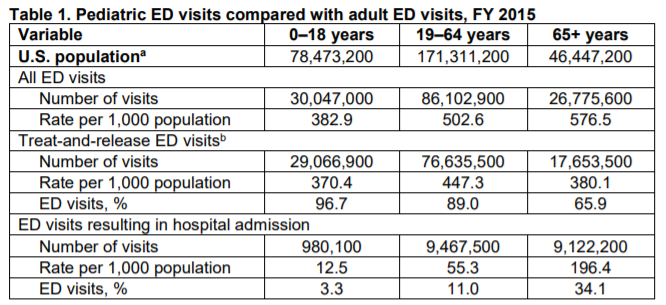How will AI-Triage Tools help reduce 70% of unnecessary ER visits?
According to the Agency for Healthcare Research and Quality (AHRQ) the vast majority of the 142.8 Million ER visits in 2015 were "treat and release" and did not result in admission to the hospital.
Only 3.3% of the 30 Million ER visits by patients 0-18 resulted in admission to the hospital.
Only 11.0% of the 86.1 Million ER visits by patients 19-64 resulted in admission to the hospital.
Only 34.1% of the 26.7 Million ER visits by patients 65+ resulted in admission to the hospital.
Wow. Looking at these numbers it is clear that patients need services to help them assess whether or not to head to the ER. Patients are wasting valuable time waiting in overcrowded Emergency Departments and the costs of an ER visit for patients (median cost estimated between $1,233 to $2,168) are way higher than the costs of an urgent care clinic visit (average cost $150). It's important to note that in the States the majority of insured people are on high-deductible plans that only kick in after, on average, $1,217 in fees (so an ER visit is much more expensive than an urgent care clinic visit).
AI-Triage Chatbots trying to become the standard (Mobi Health News): The popularity and number of AI-Triage chatbots that help patients understand whether to seek care (instead of Dr. Google) is increasing. Sometimes these chatbots connect patients to video chats with doctors or take them to an appointment booking site, but the core focus of these chatbots is to support doctor's work. The article focuses in on two companies, UK's Babylon Health and Boston's Buoy Health. Buoy Health's free symptom chatbot provides users info on what is wrong with them and if they should seek medical attention, and they are teaming up with Employers (for revenue) and so that employees will be able to see which of the nearest doctors are in their network.
AI Can Help Transform Primary Care (Stanford Medicine News): 51% (500 million visits per year) of all physician office visits are to primary care physicians. Dr. Steven Lin, Vice Chief of Technology Innovation at Stanford's Division of Primary Care and Population Health, believes primary care is where the power and opportunity of AI can be realized. AI can help physicians with clinical documentation and automate tasks such as "pre-visit planning, insurance-eligibility checks, insurance claims, prior authorizations, appointment reminders, billing, coding, data reporting and analytics." AI can also adjust physician patient load by making sure patients see doctors based on the complexity of their condition (otherwise it will send them to nurses, medical assistants, etc.) Dr. Lin also mentions that AI can help reduce health care costs -- for example, in the US, 1/10 of hospital expenditures are on potentially preventable conditions. Read the full article from the Journal of General Internal Medicine here. His article mentions companies such as Babylon Health, Health Tap, Ada, Buoy, and Your.MD that have developed "AI doctors" that provide patient facing apps that give health advice directly to patients, moving them away from Dr. Google and freeing up time for primary care physicians for more complex care.
Babylon Health Provides AI Software for Prudential Asia Insurance (Forbes)/(Business Insider): In August of 2018 Prudential Asia signed a $100 Million deal with Babylon Health to use Babylon's AI-powered symptom checker in it's apps across 12 counties in Asia. In July 2019 their app "Pulse" was released in Malaysia. Prudential Asia also partnered with DoctorOnCall so that patients can use Babylon' Health’s symptom checker and then decide if they want to pay for a virtual doctor consultation. Afterwards, if required, a prescription can be provided and medications can be sent directly to the patient. The vast majority of people in Asia do not pay for health insurance, and Prudential Asia is trying to educate consumers about the benefits of health insurance.
Update: Yesterday Anthem Inc. and K Health announced a partnership that will allow consumers, including those without Anthem’s insurance to use K’s symptom checker, text with doctors, schedule visits, and pay for visits through a joint app. Read more here. You can hear about Anthem’s AI/digital plans in general on the nvidia podcast here.
Brave Care is developing a triage tool specifically for kids (TechCrunch): Brave Care, coming out of Y Combinator, has opened their first child-centered urgent care clinic in Portland, Oregon. They are planning on coming out with a self-guided triage tool that will help parents decide if to take their children to the ER. Why? 96.7% of the 30 million pediatric visits to the ER in 2015 were just "treat and release" visits that did not require admission to the same hospital.


